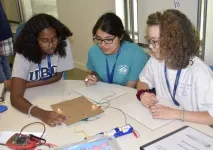(Press-News.org) Wearing a protective face mask has only a modest effect on the ability of healthy people to do vigorous exercise, according to a study published today (Monday) in the European Respiratory Journal [1].
Researchers carried out detailed testing on breathing, heart activity and exercise performance in a group of 12 people while they were using an exercise bike with and without a mask.
Although they found differences in some measurements between wearing a mask and not wearing a mask, they say that none of their results indicate any risk to health. This suggests that masks could be worn safely during intense exercise, for example to reduce COVID-19 transmission between people visiting an indoor gym.
The study was by a team of researchers including Dr Elisabetta Salvioni from Centro Cardiologico Monzino, IRCCS, Milan, Italy, and Dr Massimo Mapelli and Professor Piergiuseppe Agostoni from Centro Cardiologico Monzino and the University of Milan.
Dr Salvioni said: "We know that the main route of transmission for coronavirus is via droplets in the breath and it's possible that breathing harder during exercise could facilitate transmission, especially indoors. Research suggests that wearing a mask may help prevent the spread of the disease, but there is no clear evidence on whether masks are safe to wear during vigorous exercise."
To address this question, researchers worked with a group of healthy volunteers made up of six women and six men with an average age of 40. Each person took part in three rounds of exercise tests: once while not wearing a face mask, once wearing a surgical mask (blue, single-use mask) and once wearing a 'filtering face piece 2' or FFP2 mask (white, single use mask believed to offer slightly better protection than a surgical mask).
While the volunteers used an exercise bike, the researchers measured their breathing, heart rate, blood pressure and the levels of oxygen in their blood.
Results of the tests showed that wearing a face mask had a small effect on the volunteers. For example, there was an average reduction of around ten per cent in their ability to perform aerobic exercise (according to their 'peak VO2' which is a measurement of their highest possible oxygen uptake).
The results also indicate that this reduction was probably caused by it being slightly harder for the volunteers to breathe in and out through the masks.
Dr Mapelli said: "This reduction is modest and, crucially, it does not suggest a risk to healthy people doing exercise in a face mask, even when they are working to their highest capacity. While we wait for more people to be vaccinated against COIVD-19, this finding could have practical implications in daily life, for example potentially making it safer to open indoor gyms.
"However, we should not assume that the same is true for people with a heart or lung condition. We need to do more research to investigate this question."
The team are now studying the impact of wearing a face mask while carrying out daily activities, such as climbing the stairs or doing housework, in healthy people and those with heart or lung conditions.
Professor Agostoni added: "COVID-19 has hit our region and our hospital so hard, with devastating effects at a personal, professional and organisational level. Despite that, this was one of many studies carried out with enthusiasm by our young researchers.
"We are particularly proud of this work because it began spontaneously during our free time in the otherwise depressing period of the current pandemic and our findings demonstrate the necessity of clinical research, even during an emergency."
Professor Sam Bayat from Grenoble University Hospital, France, is Chair of the European Respiratory Society (ERS) Clinical Respiratory Physiology, Exercise and Functional Imaging Group and was not involved in the research. He said: "There are still gaps in our knowledge of how to limit the spread of COVID-19, but we believe face masks have a role to play and we are becoming accustomed to wearing face masks in public spaces such as shops, trains and buses.
"Although these results are preliminary and need to be confirmed with larger groups of people, they seem to suggest that face masks can also be worn safely for indoor sports and fitness activities, with a tolerable impact on performance."
INFORMATION:
The initial insights from the study, aptly named DESIRE (Developing and Evaluating Short-acting Innovations for Rectal Use), are being reported on March 6 in a Science Spotlight session at the virtual meeting of the Conference on Retroviruses and Opportunistic Infections (CROI), March 6-10. The presentation will be available for registered participants and media to view throughout the meeting.
Conducted by the National Institutes of Health (NIH)-funded Microbicide Trials Network (MTN), DESIRE focused on potential delivery methods for rectal microbicides - topical products being developed and tested to reduce ...
Tokyo, Japan - Researchers from Tokyo Metropolitan University have studied the properties of mixtures of silicone-coated "magic sand", a popular kid's toy, and normal sand. Silicone-coated sand particles were found to interact with each other only, and not with other sand particles. The team discovered that adding silicone-coated sand beyond a certain threshold leads to an abrupt change in clustering and rigidity, a simple, useful way to potentially tune the flow of granular materials for industry.
Sand is a fascinating material. It can flow and be poured like a liquid, ...
Scientists at Walter Reed Army Institute of Research, in a collaboration with Duke University, have confirmed that monoclonal antibodies can be an effective tool in the global fight against malaria.
The study, led by Dr. Sheetij Dutta, chief of the Structural Vaccinology Laboratory at WRAIR, showed that mAbs such as CIS43 were most effective in a culture-based assay that measured malaria parasites' ability to infect a human liver cell, while another mAb 317 showed the best activity in a mouse infection model. Dutta added "difference in assay outcomes for mAbs could reflect distinct sites on the circumsporozoite protein that can be exploited for developing improved vaccines." The ...
HOUSTON - (March 5, 2021) - Even a small effort up front can boost the abilities and confidence of girls as they anticipate taking challenging science courses.
A long-running summer program at Rice University and elsewhere that trains high school girls in basic physics concepts has proven successful in helping them thrive when they take on full courses the next year.
When leaders of Rice's two-week day camp looked at similar programs beyond Houston, they found participants scored 3% better in high school physics than their counterparts who did not have the equivalent summer experience.
"That doesn't seem like a lot, but it's really hard to move the needle on student outcomes, so 3% is significant," said Carolyn Nichol, an assistant ...
BUFFALO, N.Y. - New research using a nationally representative sample of more than 12,000 participants shows the collateral consequences victims are likely to confront following unfair treatment by police.
Michael Brown, George Floyd and Tamir Rice are just some of those who have died recently at the hands of police.
Their names are now tragically familiar, but thousands of other people who are unjustly stopped, searched or questioned by law enforcement will likely experience a range of detrimental outcomes associated with unfair police treatment, including depression, suicidal thoughts, drug use, and a loss of self-efficacy, according to Christopher ...
ITHACA, N.Y. - Public grants to build rural broadband networks may not be sufficient to close the digital divide, new Cornell University research finds.
High operations and maintenance costs and low population density in some rural areas result in prohibitively high service fees - even for a subscriber-owned cooperative structured to prioritize member needs over profits, the analysis found.
Decades ago, cooperatives were key to the expansion of electric and telephone service to underserved rural areas, spurred by New Deal legislation providing low-interest government grants and loans. Public funding for rural ...
BUFFALO, N.Y. -- It looks like science fiction: A machine dips into a shallow vat of translucent yellow goo and pulls out what becomes a life-sized hand.
But the seven-second video, which is sped-up from 19 minutes, is real.
The hand, which would take six hours to create using conventional 3D printing methods, demonstrates what University at Buffalo engineers say is progress toward 3D-printed human tissue and organs -- biotechnology that could eventually save countless lives lost due to the shortage of donor organs.
"The technology we've developed is 10-50 times faster than the industry standard, and it works with large ...
According to the Pew Research Center, 1 in 10 American adults have landed a long-term relationship from an online dating app, such as Tinder, OKCupid and Match.com. But what compels people to "swipe right" on certain profiles and reject others?
New research from William Chopik, an associate professor in the Michigan State University Department of Psychology, and Dr. David Johnson from the University of Maryland, finds that people's reason for swiping right is based primarily on attractiveness and the race of a potential partner, and that decisions are often made in less than a second.
"Despite online dating becoming an increasingly popular way for people to meet one another, ...
Powerful new genetic engineering methods have given scientists the potential to revolutionize several sectors of global urgency.
So-called gene drives, which leverage CRISPR technology to influence genetic inheritance, carry the promise of rapidly spreading specific genetic traits throughout populations of a given species. Gene-drive technologies applied in insects, for example, are being designed to halt the spread of devastating diseases such as malaria and dengue by preventing mosquito hosts from becoming infected. In agricultural fields, gene-drives are being developed to help control or eliminate economically ...
Strong, collaborative relationships with principal investigators are a key factor of longevity in clinical research coordinator positions -- an essential, but increasingly transient job in executing treatment-advancing clinical trials, Vanderbilt University Medical Center researchers found.
Danielle Buchanan, BS, clinical translational research coordinator III in the Department of Neurology, and Daniel Claassen, MD, MS, chief of the Division of Cognitive Disorders and associate professor of Neurology, found the top factor for retention is a close working relationship between clinical research coordinators (CRCs) and the study's principal investigator that emphasizes respect and collaboration. Salary followed as the next factor for retention among 85 former or current CRCs who responded to ...



